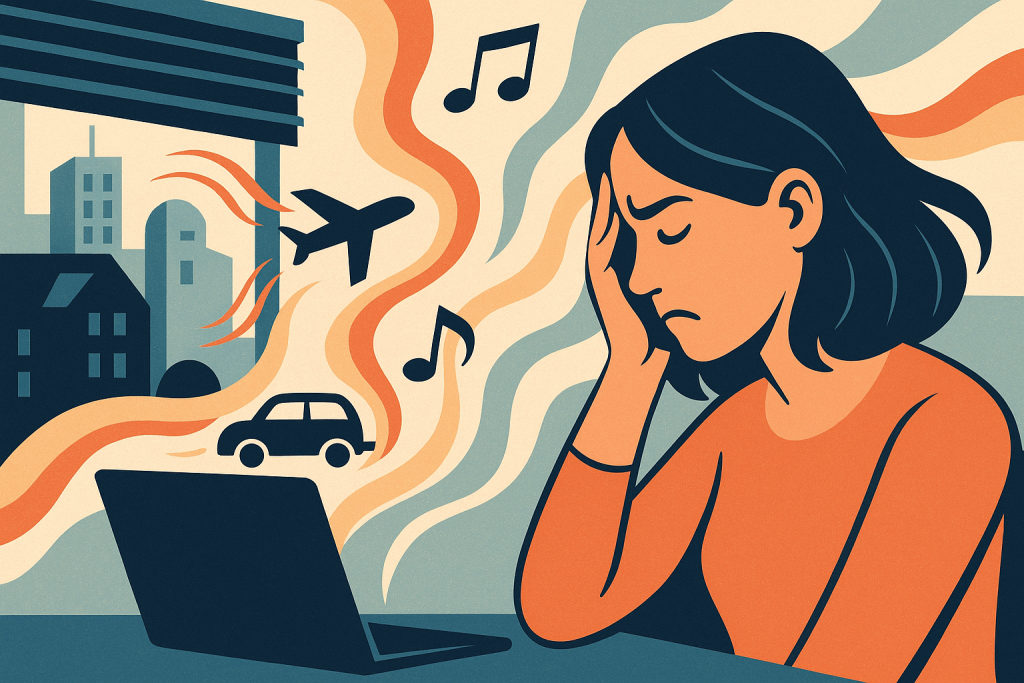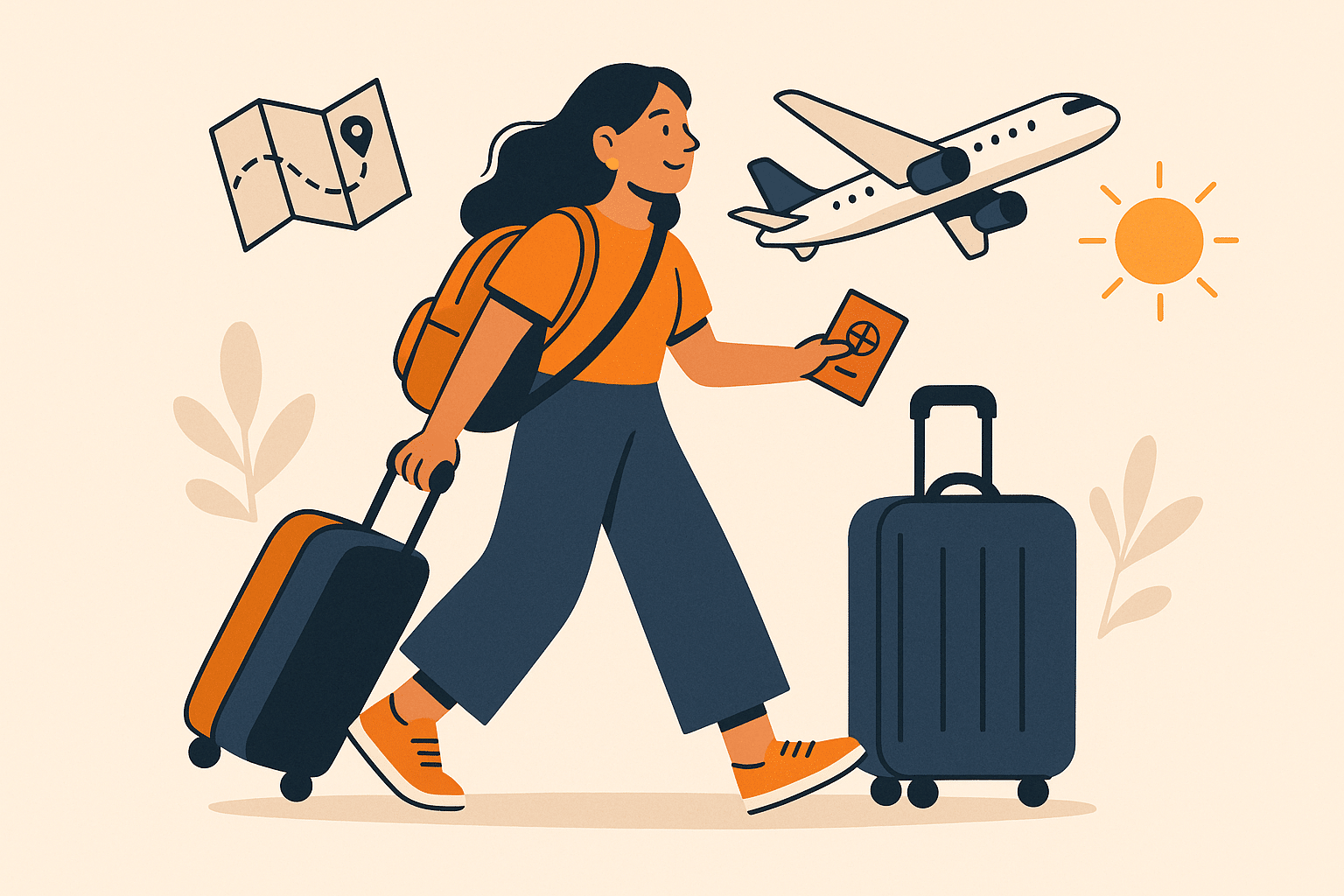Noise pollution is increasingly recognized as a serious threat—not just to hearing—but to mental health and cognitive function. Emerging research reveals how noise pollution can disrupt brain biology, learning, concentration, and emotional well-being. In this guide, we explore the latest findings, practical coping strategies, and why reducing urban noise is a growing priority.

1. What Exactly Is Noise Pollution and Why It Matters
Noise pollution refers to persistent, unwanted sounds—like traffic, aircraft, construction, or loud neighbors—that interfere with daily life. According to the WHO and EU, over 113 million Europeans are regularly exposed to harmful road traffic noise above 55 dB—enough to trigger stress and sleep disturbance .
Chronic exposure to sound levels between 50–70 dB activates stress systems (sympathetic nervous system and HPA axis), provoking annoyance, elevated cortisol levels, and poor sleep. This cascading stress response can lead to lasting emotional and cognitive impacts.
2. The Science Behind Noise, Stress & Mental Health
Recent studies have found that noise pollution isn’t just annoying—it can cause inflammation, oxidative stress in brain tissue, and structural changes in areas tied to cognition and emotion. Animal models exposed to traffic or aircraft noise showed:
- Hyperactive stress responses and elevated cortisol
- Shrinkage in hippocampus, prefrontal cortex, and amygdala
- Signs of depression- and anxiety-like behavior
In humans, higher traffic noise levels correlate with a 12% increase in depression risk per 10 dB rise—and about 9% higher odds of anxiety. Other population studies confirm links between noise and elevated medication use, self-reported stress, and lower mental well-being.
Spotlight on Youth Mental Health
A longitudinal JAMA‑published UK study traced 9,065 individuals from birth to age 24. It found that childhood and teen exposure to noise pollution raised anxiety risk significantly (adjusted odds ratios ~1.19–1.22).
3. How Noise Pollution Undermines Focus and Learning
a) Sleep Disruption & Cognitive Fatigue
Nighttime noise fragments sleep, degrading memory consolidation and concentration. Studies in adolescents living near busy roads show bedtime disruptions and reduced attention spans .
b) Impairment of Directed Attention
Experiments reveal that random background noise reduces task performance by about 15%, increasing blink rates—a measurable sign of attentional fatigue. Those with ADHD showed mixed effects, hinting noise interacts with individual traits.
c) Learning Deficits in Children
Children attending schools in high‑noise zones score ~15% lower on memory and reading tasks compared to peers in quieter settings. Constant noise impairs auditory processing and disrupts classroom learning.
4. The Stress–Mental Health Feedback Loop
Noise pollution fuels a vicious cycle:
- It triggers stress responses—both physiological and psychological.
- Persistent distraction leads to fatigue and focus loss.
- Disrupted sleep heightens irritability, anxiety, and vulnerability to depression.
- Chronic stress impairs coping mechanisms, leading to maladaptive behaviors like unhealthy drinking or smoking.
This loop compounds—noise disturbs sleep; poor sleep fuels stress; stress worsens mental health and diminishes resistance to external pressures.
5. Urban Interventions & Emerging Innovations
Cities across Europe are deploying creative methods to combat noise pollution:
- In France, apps like SonoRezé allow residents to geolocate and report noise for policymakers
- Paris and Nice are implementing noise‑reduction plans: traffic-calming, rubber road surfaces, and quieter infrastructure .
- Urban planning increasingly integrates soundproofing, green belts, and low-noise pavement
On the tech side, “quiet computing” strategies in open‑plan offices—acoustic pods, masking systems, and personal noise‑cancellation—are gaining popularity to protect focus.
6. Personal Solutions to Reduce Noise Impact
While policy evolves, individuals can act now:
- Noise‑cancelling headphones or earplugs help in transit or loud workspaces.
- White noise machines can mask disruptive urban sounds.
- Create quiet zones at home—use rugs, curtains, door seals.
- Adopt relaxation habits like meditation, exercise, or forest-walks that counter stress .
- Time-shift tasks to quieter periods, like mornings before rush-hour.
- Advocate locally—pitch soundproofing in schools, or support development of green buffer zones.
7. Why the Conversation is Heating Up Now
Noise pollution is finally getting attention thanks to:
- The WHO estimating over 1 million lost healthy life-years annually in Europe due to transport noise .
- Rising public awareness of urban wellness post-lockdowns, when quieter environments revealed noise’s harm.
- Tech and health sectors collaborating on tools—smartphone noise monitors, acoustic sensors, and biofeedback wearables—for real-time exposure tracking.
8. Noise Evolving Into a Mental Health Priority
As we redefine “health boundaries,” noise is now viewed through the lens of environmental well-being. Findings suggest:
- Chronic noise may worsen existing conditions in children or those with mental illness.
- Silence and nature—through attention restoration—support recovery from focus fatigue and stress.
- Urban green spaces offer dual benefits: pollution reduction and sound buffering that promote mental health .
9. Call to Mindful Action
Sound management deserves a seat at mental health strategy tables:
- Policy: Invest in quiet urban design—bars on heavy traffic, stricter construction noise standards, soundproofing schools.
- Planning: Prioritize access to silent green spaces and support “quiet zones.”
- Awareness: Empower individuals to monitor noise and speak up locally.
- Wellness: Encourage routine quiet breaks, relaxation techniques, and sensory mindfulness.
Conclusion
Noise pollution is far more than a nuisance—it reshapes stress responses, interrupts focus, and erodes mental health. But with growing research, community tools, and policy innovation, quieter cities and workplaces are possible. Whether through green spaces or noise-cancelling gear, reclaiming silence isn’t luxury—it’s mental health protection in a busy world.
References
- 1. World Health Organization (WHO). (2018). Environmental noise guidelines for the European Region. World Health Organization Regional Office for Europe.
- https://www.who.int/europe/publications/i/item/9789289053563
- 2. European Environment Agency (EEA). (2020). Environmental noise in Europe — 2020.
- https://www.eea.europa.eu/publications/environmental-noise-in-europe
- 3. Münzel, T., Sørensen, M., Gori, T., Schmidt, F. P., Rao, X., Brook, J., & Rajagopalan, S. (2018). Environmental noise and the cardiovascular system. Journal of the American College of Cardiology, 71(6), 688–697.
- https://doi.org/10.1016/j.jacc.2017.12.015
- 4. Stansfeld, S. A., & Clark, C. (2015). Health effects of noise exposure in children. Current Environmental Health Reports, 2(2), 171–178.
- https://doi.org/10.1007/s40572-015-0044-1
- 5. Crombie, R., Clark, C., & Stansfeld, S. A. (2011). Environmental noise exposure, early biological risk and mental health in nine to ten year old children: a cross-sectional field study. Environmental Health, 10(1), 39.
- https://doi.org/10.1186/1476-069X-10-39
- 6. Floud, S., Vigna-Taglianti, F., Hansell, A., Blangiardo, M., Houthuijs, D., Breugelmans, O., … & Jarup, L. (2013). Exposure to aircraft and road traffic noise and associations with heart disease and stroke in six European countries: a cohort study. Environmental Health Perspectives, 121(5), 627–633.
- https://doi.org/10.1289/ehp.1207388
- 7. Dzhambov, A. M., Markevych, I., Lercher, P., Browning, M. H. E. M., Tischer, C., & Nieuwenhuijsen, M. (2022). Environmental noise and risk of mental health disorders across the life course. JAMA Psychiatry.
- https://jamanetwork.com/journals/jamapsychiatry/fullarticle/2792765
- 8. Ville de Paris. (n.d.). Le bruit à Paris.
- https://www.paris.fr/pages/le-bruit-a-paris-2392
- 9. Ville de Rezé. (n.d.). Bruit – SonoRezé.
- https://www.reze.fr/vivre-a-reze/cadre-de-vie/environnement/bruit-sonoreze
- 10. MacKinnon, C., & Czepiel, A. (2020). Workplace acoustics: The rise of quiet tech. Harvard Business Review Digital Articles.






